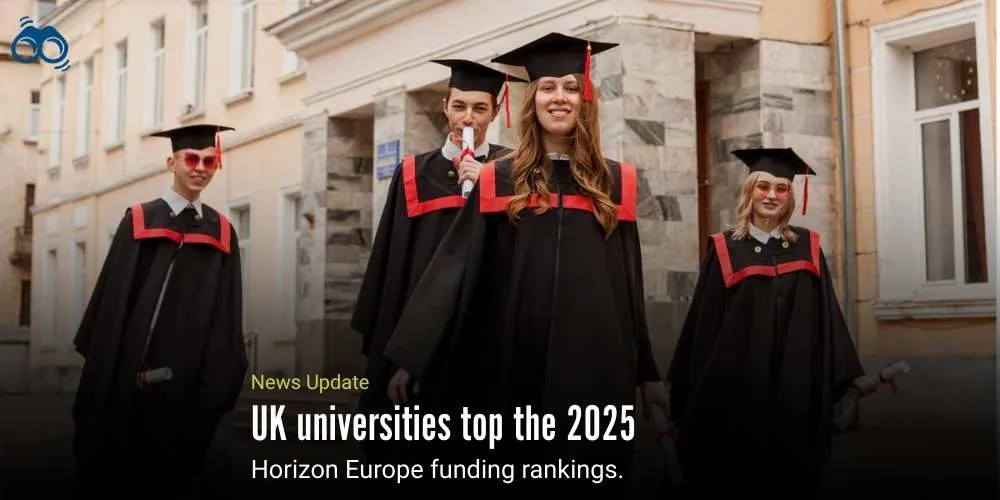UK Universities Surge in Horizon Europe 2025, Strengthening Global Research Ties
Cambridge University, Britain, and Oxford University, Britain Lead European Research Table in 2025
In what analysts have described as a defining year for UK universities, Oxford and Cambridge have reportedly taken the lead in the Horizon Europe 2025 results, following Britain’s full reintegration into the EU’s flagship European research programme last year. According to provisional rankings, Oxford University in the UK and the University of Cambridge in the UK have overtaken the University of Copenhagen and KU Leuven, last year’s frontrunners, to claim the top two positions.
Although final figures are yet to be confirmed, with four months remaining in the calendar year, commentators have noted that the UK’s performance has already far exceeded its 2024 showing. It was reported that 88 UK unis had secured a combined €431 million in Horizon Europe funding so far in 2025, accounting for approximately 15% of the €2.78 billion awarded to universities across Europe. This figure is nearly double the €219 million received in 2024, when the UK was still regaining momentum after being excluded from the programme between 2021 and 2023.
Observers have attributed this dramatic improvement to a strategic outreach campaign launched by the UK government in January 2025. The initiative was said to include “pump priming” grants to support applicants, a renewed PR drive, and a series of nationwide roadshows offering practical guidance and networking opportunities. Events were reportedly held across Scotland, Northern Ireland, and the West Midlands, followed by outreach in Wales and London. In addition, UK researchers were understood to have travelled to Italy, Germany, and Spain to strengthen cross-border collaborations and build competitive proposals.
Government officials have since unveiled further plans to expand national participation in Horizon Europe, which offers €93.5 billion in funding between 2021 and 2027. The programme is widely recognised for supporting research into global challenges such as healthcare innovation and climate change mitigation, while also promoting international collaboration. UK researchers now have the opportunity to work alongside peers from across Europe and other participating countries, including Canada and South Korea.
It was emphasised that Horizon Europe is not merely a funding mechanism but a strategic driver of economic growth, enabling the development of transformative technologies, products, and solutions. The UK’s performance in the latest European Research Council (ERC) Synergy Grants, where it hosted 18 projects and ranked second among participating countries, was cited as evidence of growing institutional confidence and research competitiveness. Building on this momentum, the government has announced a new round of Horizon Europe roadshows for 2025. These sessions are intended to help researchers and businesses navigate the application process, with upcoming events planned in Wales and London. The roadshows are expected to provide practical advice and connect participants with experienced applicants, particularly those new to the programme.
In parallel, UK researchers and businesses will continue to engage internationally, with planned visits to Italy, Germany, and Spain aimed at developing strong collaborative networks. These engagements are particularly valuable for institutions seeking to improve their success rates in Horizon Europe. To broaden awareness, a renewed PR campaign is scheduled for 2025, targeting R&D-focused businesses and showcasing successful projects in fields such as medical research and green technologies. The campaign will reportedly utilise platforms including LinkedIn and podcasts to reach a wide audience and highlight the support available to applicants.
In addition, Innovate UK is offering travel awards of up to £700 to help cover costs for those attending Horizon-related events across Europe. These grants are designed to facilitate networking and improve the quality of UK applications for Horizon funding. One notable example of Horizon Europe’s impact is Recycleye, a UK company developing AI-powered robotics for waste sorting. With a €385,000 grant, the firm has refined its technology and scaled operations, positioning itself as a leader in the European waste management sector.
The success of institutions such as Cambridge Uni, UK and Oxford University has also drawn attention to the broader landscape of university funding in Britain. Analysts have pointed to the strategic use of Cambridge research funding and Oxford University research grants as key factors in their Horizon Europe performance. The prominence of universities in Cambridge and the University of Oxford and Oxford University in the 2025 rankings has further reinforced their status as global research leaders. As the UK continues to strengthen its position in European research programs, the government remains committed to equipping researchers and businesses with the tools, knowledge, and networks they need to succeed. With Horizon Europe funding fully accessible and collaborative opportunities expanding, 2025 is widely regarded as a transformative year for British science, innovation, and global research leadership.
Editor’s Note
The UK’s full reintegration into Horizon Europe marks a decisive turning point for national research competitiveness. The strong performance of Oxford and Cambridge at the top of the 2025 league table is not only a symbol of Britain’s research excellence but also a reflection of renewed momentum across the wider sector, with 88 universities already securing significant funding. Horizon Europe, with its €93.5 billion budget, is more than a grant scheme: it is a platform for tackling global challenges from climate change to healthcare innovation. The UK government’s targeted interventions, roadshows, pump priming grants, and PR campaigns have clearly paid off, rebuilding confidence and strengthening Britain’s position as a trusted partner in European research. International collaboration is central to this progress. By reconnecting with partners in Germany, Italy, Spain, and extending links with countries such as Canada and South Korea, the UK is using Horizon Europe not only to fund projects but to rebuild trust and connectivity in the post-Brexit landscape. Success stories such as Recycleye, alongside the UK’s strong showing in European Research Council Synergy Grants, show the tangible impact of this participation on innovation, industry, and society.
According to Skoobuzz, if universities, businesses, and policymakers continue to work together, the UK can seize this moment to shape a more innovative, collaborative, and globally competitive future for research.














0 Comments (Please Login To Continue)